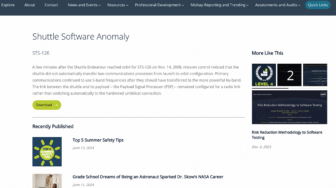Jody Singer: The Shuttle Propulsion Systems: Mitigating Development Risk through Testing
As NASA approaches the final flight of the Space Shuttle, it is timely to reflect upon the many important lessons learned from the formulation, development, and operation of the Space Shuttle program. The Space Shuttle represented a dramatic departure from the launch and space vehicles of the preceding Apollo era, with a new focus on routine access to low-Earth orbit, utilizing a high degree of reusability—and higher flight rates—to attempt to meet its many challenging goals. There is much to be learned from this pioneering effort and, fortunately, many of the master program/project manager practitioners who were involved in the shuttle program are still available to share these stories and lessons learned with current and future practitioners within NASA. This panel will examine the transition from the Apollo era to the shuttle program, the early conceptualization and definition of the shuttle, the development of its many challenging new systems and subsystems, the changing political environment, and its flight and mission operations over the past thirty years since its first flight: STS-1, on April 12, 1981. The panelists have experience in each of these phases of the program, including extensive involvement in Apollo through the development of the Space Shuttle itself, and its subsequent launch, flight, and mission operations, which they will share from their unique perspectives.
Jody Singer currently serves in a dual role as the deputy project manager for the Shuttle Propulsion Office (SPO) and as the deputy manager for the Ares Project Office at Marshall Space Flight Center. Appointed deputy project manager of the Shuttle Propulsion Office in October 2007, she has served as the deputy project manager for the Ares Project Office since March of 2010.








